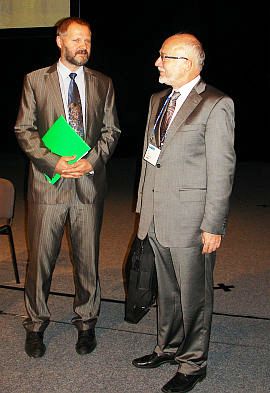The Annual Congress of Endocrinology Aimed to Spread the Art of Proper Diagnosis
Between September 22-25, Prague hosted the annual meeting of the European Society for Paediatric Endocrinology (ESPE). Dr. Jan Lebl, head of the Paediatric Clinic of the Charles University 2nd
How does Czech endocrinology fare in the international arena?
The very fact that an international endocrinology congress took place in Prague is a recognition of Czech children’s endocrionology.
How much effort did it take to bring the congress to Prague?
The site of the congress had been set five years in advance. We filed the application back in 2005 – that was in Lyon. That year, we competed against Glasgow. The voting system is very democratic, each member of the Society has one vote. We had won in a landslide, but it was Glasgow’s turn the year right after us.
Which topics did the delegates focus on? Did they talk mostly about what is new in the field, or did they cover more ground?
|
Prof. MUDr. Jan Lebl, CSc., (right) is about to open the international congress, along with the Rector of Charles Universit, professor Václav Hampl. |
In every discipline of medicine, a lot happens in a year and the annual congress is a natural outlet for it. However, among the most relevant topics this year were not the new findings, but the efforts of paediatric endocrinology to spread the knowledge of proper diagnostics and treatment of sick children all over the world. We discussed the availability of children’s diabetes treatment in Sub-Saharan Africa, where even today some children die a few weeks after showing first symptoms of the disease, as they are not hospitalised, or die shortly after being released from the hospital, because their parents cannot afford to buy insulin. Thyroid disorders were another important topic. If innate and severe, they can cause serious mental disabilities. Afflicted children used to be written off for life, even in our country. Today, the screening of newborns reveals these disorders during the second or third week of their lives, they undergo treatment and then live normally. When diagnosed, the treatment of such disorder is even quite cheap.
|
Who are the congress participants? Are they mostly endocrinologists or are there also general paediatrists who are somehow involved in the these topics?
Almost all of them are specialists who focus on endocrinology in the field of paediatrics. There are basically two groups of experts. The bigger one is oriented towards clinical medicine, or treatment of patients, the other one focuses more on research and laboratory work. This year’s theme is „Bridging Clinical Care and Basic Research“. This proves to be very important, as everyday patient care does inspire research, while research yields findings that should be as soon as possible applied clinically, so that we can treat our patients more effectively. One of the goals of the conference is to find mutual understanding and ways of communicating between these two groups of doctors.
Can you mention some of the renowned endocrinologists that we had the honor of hosting at the University?
3,287 participants from 92 countries came to the Congress. It was therefore the biggest meeting of paediatric endocrinologists in Europe ever. I won’t exaggerate too much if I say that anyone who is important in the field was in Prague. Among them were two of the founding members of the Society, founded in 1962. One of them is professor Zvi Laron from Israel, renowned for describing insensitivity to growth hormone, later called Laron syndrome. Professor Ruth Illig from Switzerland is another founding member, famous for her research in paediatric endocrinology in the 1960’s and 70’s. The influential Czech teacher in the field, Dr. Alois Kopecký, was a honorary guest, having celebrated his 90th
(Lucie Kettnerová)
Translation: Jaroslav Švelch
